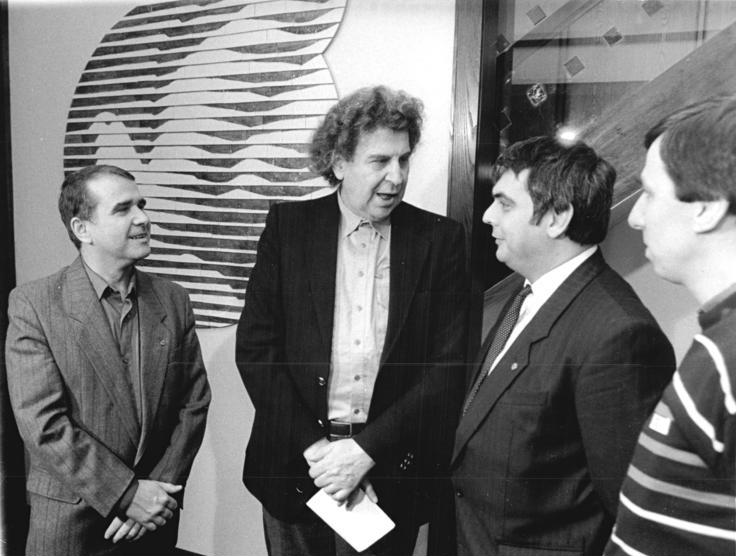
In memoriam of Mikis Theodorakis on September 2, 2021, the IF DDR interviewed Hartmut König, a former secretary for international labour and culture in the Free German Youth organisation also known as FDJ, (German: Freie Deutsche Jugend). König, an acclaimed songwriter himself, shared his reminiscences of Mikis, and the impact Theodorakis had on the song movement in the former-GDR.
International solidarity with Mikis Theodorakis after the fascist coup d’état in Greece in 1967
On April 21st, 1967, the pall of a fascist regime loomed over Greece once again for the following seven years. A junta of brigands had seized power in a coup, and Mikis Theodorakis, the hugely popular composer and communist dissident, became one of the most wanted persons by the military regime.
The junta, – as early as June 1st – via army order No° 13, had de-facto banned the reproduction, distribution and the playing of his songs and music, criminalizing it for “being at the service of communism.”
Mikis had managed to work clandenstinely for a few months before being arrested, banished, and finally deported to the Oropos concentration camp. There, he was tortured, and his tuberculosis relapsed under the toll of previous incarcerations. The bitter experiences in Oropos revived memories of hardship from his early youth. At the age of 17, he fought in the National Liberation Front (EAM) and later as a member of the Communist Party (KKE) against the fascist occupation, and subsequently after the war, he struggled for a socialist perspective for his homeland.
The pro-restoration, bourgeois, state-power repaid him with banishment and internment, culminating in his imprisonment on the concentration camp island of Makronissos.
Even then, he regarded composing as his lifeblood, and this continued to be the case during the post-1967 repression. Some of his songs had been successfully smuggled out of Greece. Among them was “The Patriots’ Front Calls!”, which he had penned and composed. Greek comrades had handed me a tape in Berlin back then. Only Mikis’s voice could be heard, accompanied by the time-keeping percussion of the claves. I translated the lyrics into German and recorded the song, which was broadcast the very same evening on GDR television.
That was only a fraction of the worldwide solidarity shown to him that had since gathered momentum. Whilst in prison, Mikis received baskets with greetings and floral drawings made by East German schoolchildren.
World-renowned artists such as Arthur Miller, Dmitri Shostakovich, Leonard Bernstein, Laurence Olivier and Paul Dessau had formed a committee advocating for his release.
In May 1970, the military junta permitted him to leave for Paris. In July of that year, I met him on the sidelines of the UN World Youth Conference, at a large solidarity event in New York’s Manhattan Center, which Arthur Miller and Pete Seeger, among others, had organised. At the event, Pete Seeger played his guitar for me, and so I sang the German version of “Die Front der Patrioten ruft” (“The Patriots’ Front Calls!”), which Mikis got to hear live for the very first time.
Mikis in the GDR
Mikis Theodorakis made his first big debut in the GDR with his “Canto General” in February 1980, during the 10th Festival of Political Song in Berlin. This came into being by a chance re-encounter with him in Berlin in 1979. I had run into him by coincidence in a hotel lobby and invited him to take part at our song festival. He agreed on condition that he’d be allowed to perform his “Canto General” oratorio there. The composition, based on texts by Pablo Neruda, which Salvador Allende had commissioned from Mikis during his presidency, – but couldn’t be premiered in the Central Stadium of Santiago de Chile due to the fascist coup, – was then performed in the Great Hall of the Palace of the Republic.
The FDJ invited Mikis to perform again at a concert at the Rosa Luxemburg Square to mark Berlin’s 750th anniversary of the founding of the city. At the concert’s end, he sang and danced with the audience, as he had habitually done the world over. Great concert halls and orchestras of the GDR performed his work. The “Oratorio Axion Esti” was performed in the Leipzig Gewandhaus,; the premiere of the “Sadducee Passion” was performed by the Berlin Symphony Orchestra and the Berlin Radio Choir; and his “Third Symphony” was performed for the first time by the Komische Oper Orchestra. All three works had been released on the GDR record label ETERNA and the “Canto” had been issued as a live recording from the Festival of Political Song as a double LP on the AMIGA label. In 1989, a dance version of the “Great Song” poem was performed in the Palace of the Republic, in Berlin.
So what was the significance of his work for the song movement in the GDR?
The song movement held his lyrical work in high esteem. We knew how much Mikis Theodorakis tried to bring great Greek poetry into the vernacular through music, – through a conveyance of sing-along. This worked fantastically in Hellas, because in this way, what would otherwise have remained in the domain of the educated bourgeoisie suddenly settled alongside wine, bread and olives at the everyday tables of ordinary people, at their workplaces and picket lines. The great Greek poet Jannis Ritsos, who was a friend of Mikis, once raved about this effect.
I always think of his lyric “The whole earth to us!” which ends with the corollary: “…and not one bit to our enemies”.
The song had found its way into the repertoire of many singing clubs, which is why I also recited it at the Manhattan Centre alongside “The Patriots’ Front Calls!”. But it wasn’t just concrete songs – like the beautiful renditions from the Mauthausen Cantata – that inspired us. It was also the lyrical, combative gesture in the unity of text, composition and interpretation that was a model for us, for our own themes. Incidentally, Mikis greatly appreciated the Festival of Political Song, which had emerged from the GDR (song) movement and had been organised by many volunteers.
Returning to Athens from the 10th festival, he described his participation there as “one of the most moving and wonderful experiences” of his life. “The children who had sent us thousands of painted flowers to the junta prisons…were there, present in the Hall. Our struggle and sacrifices hadn’t t been in vain. The seeds have sprouted.”
Theodorakis in the further development of Greece
Mikis was a combative person who followed his moral precepts on freedom and justice. This also left him in doubt and fatigued. He had always testified to his anti-imperialist principles, had spoken out against the NATO bombing of Yugoslavian cities and the US war in Iraq, and yet at times he thought himself worn out from politics and could only find fulfillment in his music. His character precluded him being away from politics for long. When a troika with an EU mandate went out to ruin Greece’s economy and the social status of its people, he came back once again to the forefront of the demonstrations. In the end, you could see him struggling against the decline of his strength while directing in his wheelchair.
Now the “Great Greek”, composer and people’s tribune has died at the age of 96. It is hard to believe; we cling steadfast to our cherished reminiscences of him and his opulent oeuvre. No less to his political legacy; which he recently wrote to the General Secretary of the Communist Party of Greece (KKE): “Now at the end of my life…I see that in my most decisive, strongest and most mature years I was under the banner of the KKE. That is why I want to leave this world as a communist.” His avowal will make the rounds and warm the hearts of comrades. Worldwide.
Because: We are everywhere on earth! Incidentally, – this is also a song of the GDR song movement.

